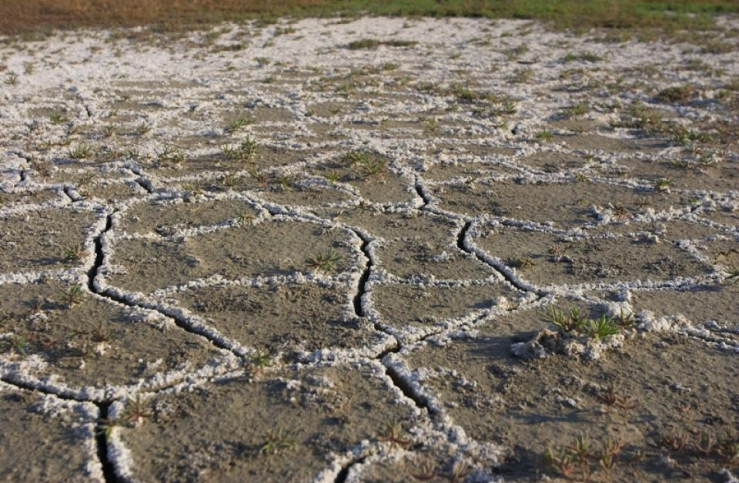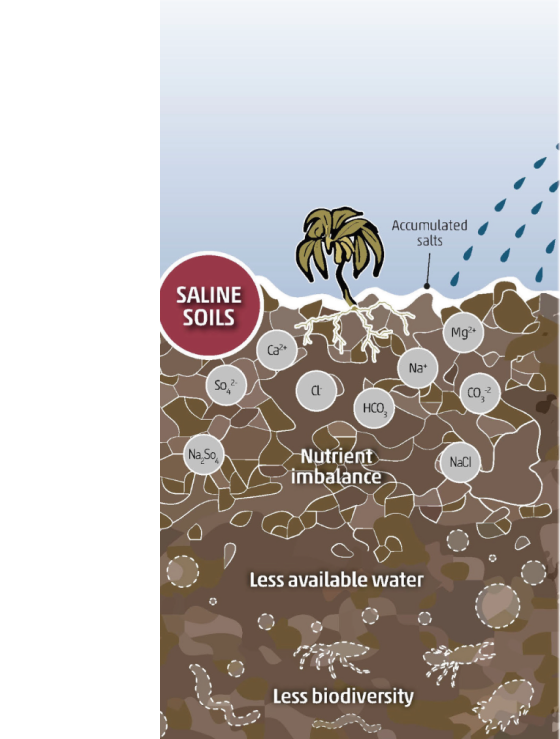LAND SALINITY OVERVIEW
High soil salinity is the accumulation of water-soluble salts in a particular area, consequently reducing the water absorption rate in the affected area. Typically, the salinity level of an area is influenced by the presence of a high amount of table salt (NaCl) or other inorganic compounds such as sulfates, calcium, magnesium, potassium, sodium, bicarbonates, and carbohydrates.
High salinity or salinization can happen naturally or due to improper anthropic activities, particularly in agriculture. The natural causes include low precipitation, dry climates leakage from geological deposits into the groundwater, seawater submergence, subsequent evaporation, and breezes in the coastal areas, moving salty air masses into nearby areas. Anthropic causes of salinization, on the other hand, include inappropriate application of fertilizers, irrigation with water containing high salt levels, poor drainage, waterlogging, and uprooting of deep-rooted plants.

HIGH SALINIZATION CHALLENGE IN AGRICULTURE
Salinization remains one of the major challenges facing agriculture in the world, particularly in areas with persistent droughts and sea level rise. It significantly affects agriculture by negatively impacting almost all aspects of plant development, including germination, reproductive development, and vegetative growth. Salinization also limits agricultural productivity levels by creating osmotic stress, ion toxicity, nutrient deficiency, and oxidative stress for plants. Oxidative stress and osmotic toxicity lower the water uptake in plants to slow growth rate.
Many soils today have an unacceptable high Sodium content, sometimes further increased by extensive use of synthetic fertilizers (mostly salts!) and groundwater irrigation usage (slight salt content). According to the FAO, the global area of salt-affected soils covers 424 million hectares of topsoil (0–30 cm) and 833 million hectares of subsoil (30–100 cm) (based on 73% of the land mapped so far) (FAO, 2021a). The Intergovernmental Science-Policy Platform on Biodiversity and Ecosystem Services (IPBES) also reported that as of 2018, about 190 million acres of land are completely lost, 150 million acres salinization. Other studies show that 1 billion hectares of land are negatively affected by salinity, including more than 20% of all the irrigated arable land (Ghassemi et al., 1995; Qadir et al., 2014). are damaged, and 2.5 billion acres are impacted by

RESCAYPE CREATING EFFECTIVE SOLUTION TO SALINIZATION
Salinization affects large areas of the earth’s surface, including areas explored for agriculture, making it a major challenge that requires critical solutions. Rescaype offers an effective solution to remediate salinity and create an optimized soil content to improve agricultural practices and solutions. Rescaype works by mechanizing the soil and creating an “exchange platform” for two simple chemistry steps. First, the application is Gypsum + Rescaype and activated with water. Next, Rescyape attracts cations like calcium, and the released sulphate creates sodium sulphate (Na2SO4). Sodium Sulphate is highly soluble in water and will easily percolate in the topsoil to get rid of high soil salinity.
Rescyape is at the forefront of creating biotech solutions with quality and proven results from several trials. A Rescyape trail in the high Nevada Desert, USA Alfalfa field (a very sandy soil structure) lowered the “sodium” level from 1200 PPM to 10 PPM within three weeks using Rescaype 6 Kg/ha plus Gypsum 10 t/ha and activated with water. A similar trial was conducted in Mexico’s corn field analysis with samples from two locations. Treatment with Rescaype 15 Kg/ha plus Gypsum 2 t/ha and activated with water lowered the “sodium” level from 204 PPM to 60 PPM in the first location and 246 PPM to 130 PPM in the second location after only 11 days. These trials highlight the effectiveness of Rescaype solution on different soil types globally for improved agricultural practices, lowered cost, and maximized output.

GET IN TOUCH
If you have more questions about Ground Improver, don't hesitate to contact us!

